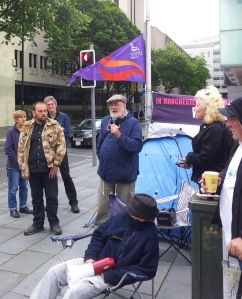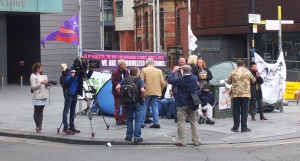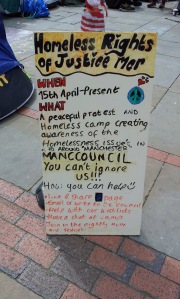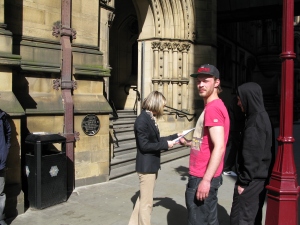The “juggernaut” of Manchester City Council appears to have changed course recently announcing new initiatives to reduce homelessness in Manchester. What has been the role of homeless protest camps and campaigns in bringing about this change?

Banner used at various homeless protest camps in Manchester. Photo: John Clegg
Recent statements by Manchester City Council relating to the opening of new hostels for the homeless, investigating the implementation of a Housing First policy and coming up with a new homelessness strategy indicate a new-found energy within the council towards tackling homelessness and rough sleeping within the city. Is this a battle won for the homeless people and their supporters who have been campaigning for the rights of homeless people since a protest camp was set up in Albert Square in April 2015? Councillors responsible for homelessness services indicate that the protestors have had nothing to do with progress made by the council in improving services to the homeless.
If you are a resident of Manchester you will probably be familiar with the homeless protest camps that have been situated at various points around the city, either by walking past them or hearing about them in the news. The council, desperate to end the bad publicity, chased the occupants of these homeless protest camps through the courts, forcing the camp to move to different locations and increasing the amount of bad publicity, both locally and nationally, the council was subject to.
In the Court of Appeal on 14 May Judge Allan Gore QC rejected an appeal against a possession order served on the protest camps, but admonished “the juggernaut” of Manchester City Council, saying: “In a democratic society of the 21st century it is an affront that vulnerable people should be left homeless.” Mentioning the increasing scale of the problem and the loss of rights homeless people suffer from, Gore concluded: “Street homelessness is a problem for all of us.”

Sign displayed at the St Ann’s homeless protest camp.
In an attempt to end the homeless protests MCC changed its strategy and attempted to get an injunction against protest camps within the city centre. Initially MCC and its legal team sought to acquire what was described in court as “an injunction against the whole world” by solicitor Ben Taylor, who was working pro bono representing the homeless defendants due to a number of requests for legal aid being refused. The injunction eventually awarded to MCC was a much watered down version of what they wanted: it was only serviceable against people “erecting and/or occupying tents or other moveable temporary forms of accommodation for the purposes of or in connection with protests or similar events arising from or connected with the Claimant’s [Manchester City Council’s] homeless policy on land”. A full report on this court case and the resulting injunction can be read here.
At the time many people supporting the campaign believed that this sort of injunction would be unenforceable due to the difficulties proving that someone was actually protesting against MCC’s homeless policy. The once-again evicted homeless protest camp took this latest development on board and set up a street/refuge for the homeless called the Ark under the Mancunian way on Oxford Rd, specifically stating it was not a protest camp.

Sign displayed at the Ark, Oxford Rd, saying it was not a protest camp. Photo: Manchester Evening News
However for some unknown reason MCC seemed to believe they could make this injunction stick in court and during the eviction proceedings of the Ark, seven people were charged with breaking the injunction, potentially facing up to two years in prison or a £5000 fine. But during the court hearing on the 30th of September “Manchester City Council was almost laughed out of court” according to a report in the Salford Star. Circuit Judge Gore on the day was particularly damning of the case presented by the council, criticising the lack of dates and descriptions of behaviours breaching the injunction. The Salford Star reported Gore describing the case presented as:
“A fundamentally misconceived and inappropriate way to advance criminal proceedings, where the party [Manchester City Council] seeks that the court orders to commit people to prison”.
The judge refused the council’s case to have the defendants committed due to breaches of the injunction, and also dismissed a possession order on the Ark camp citing serious procedural failures in the case presented by MCC.
Ben Taylor, representing the defendants, said of the case in the MEN. ”The degree of incompetence in making this application by Manchester council’s legal team is breathtaking, it beggars belief. My clients were petrified that they could be going to jail simply for living in a tent. I would have expected Manchester council to have done have done their job properly. The application was so fundamentally flawed it didn’t even get off the ground.“
Improved services for the homeless
Perhaps all this negative press and admonishments by the judiciary has had an effect? Recent statements by MCC suggest they are beginning to change their strategy when dealing with homelessness within the city. During a Neighbourhoods Scrutiny Committee meeting on 27th October 2015, a report on MCC’s Homelessness Strategy was discussed, which included a number of positive steps including the following:
- An empty buildings survey in progress, refurbishment of 18 empty properties to house the homeless, and new homeless shared housing bed spaces reopened.
- A draft code of conduct and standards for residential Bed and Breakfasts used to temporarily house homeless people, with the aim to have agencies only using accommodation signed up to the code.
- Implement a Housing First model in Manchester, which will be evaluated by York University, work to commence in April 2016.
- Evidence-based report on the effects of government policy on the housing situation in Manchester. It will cover changes to welfare and benefits payments, Universal Credit for housing paid directly to landlords and the use of benefit sanctions. The report will be sent to national government seeking to influence policy.
In a statement published by MCC on the 16th November it was announced that two unused buildings – the former Beech Mount Children’s Home in Harpurhey and the old Hulme Library – would be opened up to be used by rough sleepers, and also mentioned plans for other temporary accommodation for rough sleepers to be made available. In the statement, MCC’s executive member for adult health and well being, Councillor Paul Andrews said:
“We’ve spent months working on plans to open up empty buildings across the city to make sure nobody has to sleep rough on the streets this winter… we’re now continuing to carry out inspections so we can open more empty buildings in other parts of the city. As well as this, we’ve also reopened some buildings as shared houses, while faith groups are opening up other centres, meaning there will be a much wider range of bed spaces available across the city.”
Andrews went on to say that although this was a good start more work was needed by MCC homelessness services and its partners in the voluntary sector to: “…make sure the right help and support is available to rough sleepers so we can help them make the first steps towards getting off the streets for good.” In a later statement released on the 6th of December the council reported that 165 new bed spaces would be available in Manchester for rough sleepers this winter.
Councillors dismiss homeless protests as a distraction
During the scrutiny committee meeting, scathing remarks were aimed at the role of activists/protestors in the homelessness issues in Manchester. Councillor Andrews had this to say about rough sleepers and homeless within Manchester:
“A lot of them are not Manchester residents, a lot of the people you see on the streets at the moment especially in tents are not even homeless, they are actually professional protestors. There has been lots of stuff going on in the media to actually deal with that. Despite all that going on our homelessness teams and our officers are out every day trying to identify people who are actually homeless , to actually deal with them and get them off the streets as quick as they possibly can. That is impinged somewhat by the protestors and trying to get through the crap that’s going on with the protestors”.
These views were echoed by Councillor Hazel Summers, “I am probably not allowed to say this but I will: the protestors are actually distracting us from our job.”
Understandably the protests have been very trying for the homelessness services team, but that is the job of a protestor: to make the person responsible for dealing with the situation as uncomfortable as possible. Polite letters from the public and campaigns by homeless charities have had very little effect on changing things. The protest camps raised the profile of this issue locally, nationally and finally internationally with the involvement of Gary Neville. I don’t expect the homelessness services in Manchester to be singing the praises of the protestors, but they should recognise that the protests and the surrounding publicity have provided an extra impetus, enabling them to introduce new initiatives and speed up the provision of services already in the pipeline.
Andrews also tries to undermine the legitimacy of the initial protest camps by saying the majority of the people in the tents on the streets of our city are not even homeless and calling them professional protestors. This sort of line has been uttered by council officials before, which I described in a previous article in Contributoria. I have also heard, from a Manchester councillor, that this belief in professional protestors is prevalent in the upper echelons of MCC. So I will reiterate what I have said previously of my experience of the protest camps in Albert Square, St Peters Square and St Anns Square: activists have been an important part of this campaign, but they have always been in a minority compared to campaigning members of the homeless community.
Homeless support/campaigns post injunction
The failed attempt by MCC to enforce the injunction and eviction order on the Ark was eventually followed by a successful eviction order on the 20th of October 2015. The protest that gained the most press coverage for the plight of the homeless in Manchester was the squatting of the Stock Exchange building on Norfolk St in Manchester city centre by the Manchester Angels. The building is owned by footballing superstars Gary Neville and Ryan Giggs, who instead of dragging the squatters through the courts said the building could be used to shelter the homeless until February 2016, when building work was due to start. Another group called the Creative Hub have been squatting buildings in Manchester and offering shelter to the homeless as well as art, yoga, and education courses. The Creative Hub were evicted from their last property on Houndsworth St, along with 27 Homeless people, on the 17th of December, but according to their Facebook page they already have another squat set up.
A growing problem
The latest figures on rough sleeping in Manchester produced by MCC indicate the growing nature of the problem (see graph below), with the 2015 count of 70 being a 63% rise from the year before. And the actual figures are likely to be much worse than this as the way the count is carried out (on one night of the year with in specific city centre locations) is generally regarded to under count the problem. Councillor Summers indicated this at the Neighbourhoods Scrutiny Committee meeting: “The headcount is set up in a ways to undercount the problem, as a snapshot of one particular night”.
Rough Sleepers Headcount for Manchester 2010-15

Source: Department for Communities and Local Government
Jenny Osborne , Senior Strategy Manager of Public Health Manchester, spoke at the same meeting. “Hazel [Summers] asked me to pick up a piece of work about 5 months ago to accelerate the strategic response to the growing problem of rough sleeping we have in the city.” Osborne went on to describe how inaccurate the rough sleepers headcount was likely to be by comparing it to data gathered from the Severe Weather Emergency Protocol, where the council has an obligation to house rough sleepers in very cold/bad weather:
“Last year the headcount for rough sleepers was 47; we know that from the severe weather protocol we operated last year that 234 separate individuals accessed that provision during the cold weather period.”
The coming storm
The council initiatives are very welcome news to the homeless community in Manchester and their supporters. But will these latest efforts be enough to circumvent the perfect storm of poverty approaching due to the governments austerity agenda?
The funding cuts imposed by central government have forced MCC to make funding cuts, to Housing Related Support and the Homelessness Prevention Grant, totalling £2,013,188 in 2015. And the funding cut of 56% to the central grant given to local authorities announced by George Osborne in the autumn statement has yet to bite. The amount of social housing is set to fall with the extending of the Right to Buy to housing association properties, with vague promises to replace those sold under this scheme but no actual plans on how this will be done; similar promises have been made before and not kept. The government has got rid of the obligation for private building firms to provide social housing in their developments. The 1% rent cut every year for the next four years that Housing Associations have to make is predicted to force housing associations to abandon plans to build 27,000 new homes, according to the National Housing Federation.

Supporters outside court after first appearance for eviction from St Ann’s Square
Every cut the government makes to public spending is set to increase poverty and homelessness within the UK: social security, social care, mental health and drug/alcohol services have all been savaged by cuts, with more to follow.
The struggle continues
I believe this is a battle won for the homeless campaigns, and everyone who has supported them, in Manchester this year. The progress made by MCC Homelessness Services also deserves praise, but council members would do well to avoid churlish remarks aimed at the campaigners. There is a lot of bad blood between the two groups, who should try to remember that they are both ultimately on the same side in the continuing war against homelessness.
Currently the job of council members involved with Homelessness Services must be an exceedingly difficult one. Being faced every day with increasing levels of homelessness and having to deal with that problem with dwindling resources, must be at at times both heart breaking and soul destroying.
Councillor Fran Shone spoke powerfully at the Neighbourhoud Scrutiny Committee meeting in October of how the increasing levels of homelessness had affected her:
“The position we are in in Manchester is absolutely shameful, its awful. I can’t believe It when I walk round the city centre actually. It makes me cringe to be a councillor and to be involved with Manchester… I know lots of people are working extremely hard, but I think we have been very slow in responding to this … These people [homeless] aren’t the problem, they are vulnerable people who we have a responsibility for, and are just failing catastrophically, every day, its awful. And its something I think we as a council have been very, very weak on recently. We have to find some way to solve it whether or not we are responsible for it.”
I am confident that with the right planning and adequate resources the council could make big progress in tackling homelessness. The current council plans look promising, particularly the Housing First initiative; similar Housing First programs in the USA and Canada have provided outstanding results in reducing homelessness in a cost-effective way.
But the best laid plans will amount to very little if sufficient resources are not in place. The council needs to seriously consider whether it can reverse some of the funding cuts to Housing Related Support and the Homelessness Prevention Grant. The plan to present an evidence based report on housing/homelessness to central government is a good one, the power of which could be increased by collaborating with other councils, thus increasing the leverage power of the combined reports and improving the chance of extra funds from central government to deal with housing issues.
The chair of the Scrutiny Committee meeting, Councillor Daniel Gillard, was in no doubt as to who was responsible for the increasing levels of homelessness within Manchester:
“The ultimate blame, the ultimate moral responsibility, lies for the last 5 years, with the Tory/Liberal and now Tory government, they are the ones who should be ashamed of themselves. I would love to meet any one of those ministers in a one to one debate, and walk them round this city and shame them personally; they ought to be ashamed of themselves.”
Conrad Bower – First published in 38 Degrees Manchester on 21st Dec 2015
Facebook – https://www.facebook.com/conrad.bower
Twitter – @ConradBower1
LinkedIn – uk.linkedin.com/in/ConradBower










